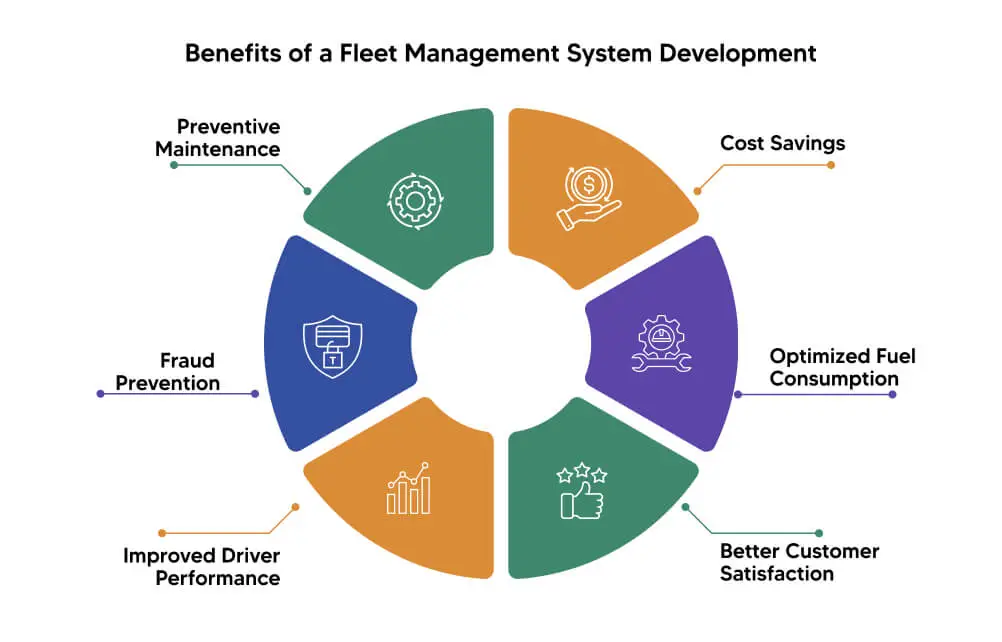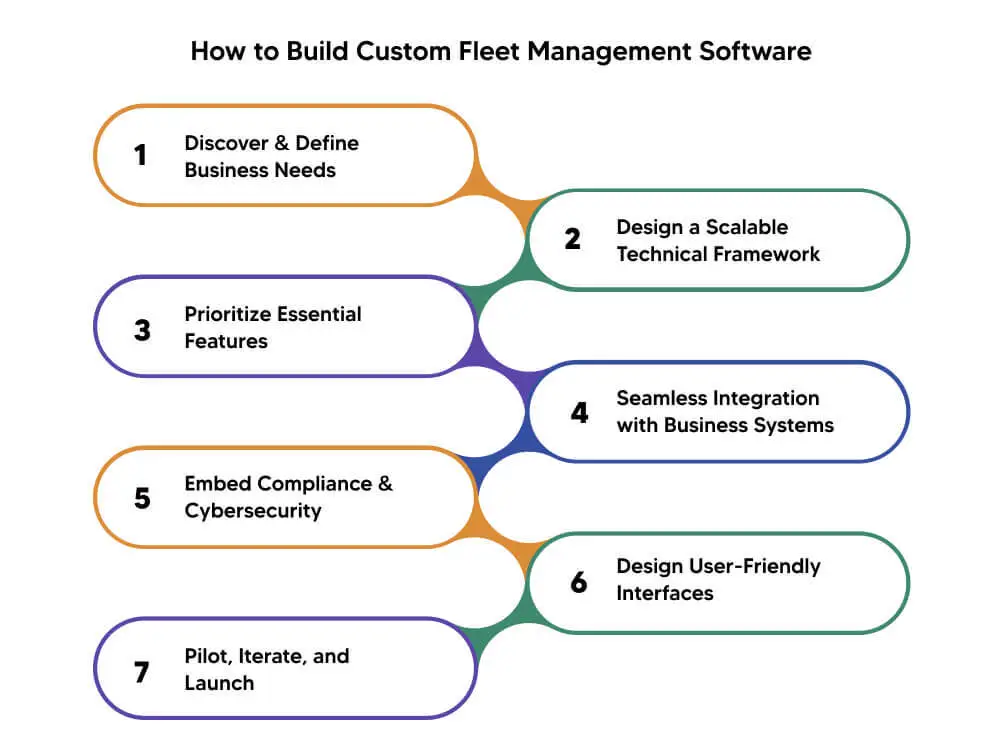Other recent blogs


Let's talk
Reach out, we'd love to hear from you!
The global fleet management market is expected to grow from $25.5 billion in 2023 to $52.4 billion by 2030, fueled by the demand for real-time operational visibility, predictive maintenance, and tighter regulatory compliance.
This soaring expansion is due to the deeper penetration of IoT-enabled vehicles, GPS integration, and AI-based analytics, which together drive a seismic shift away from fragmented spreadsheets and manual tracking in fleet management dynamics.
Fleet operators managing hundreds—or even dozens—of vehicles can no longer afford inefficiencies caused by manual tracking systems prone to delays, human error, and lack of actionable insights.
In a connected ecosystem where customer expectations, safety regulations, and operational margins are tighter than ever, embracing intelligent fleet management software solutions has become a business priority.
How is Fleet Management Software reshaping the logistics and transportation industry compared to manual tracking and fleet operations?
Fleet management software has fundamentally transformed transportation operations by offering more than just real-time vehicle tracking. Unlike manual methods, where vehicle location updates depend on phone calls, paperwork, or dispatch logs, software-based systems deliver instant, accurate, and continuous visibility. These platforms consolidate GPS tracking, telematics, fuel management, maintenance scheduling, and compliance monitoring into a unified interface, enabling operators to make fast, informed decisions.
The software uses GPS and telematics data for vehicle tracking to display live location, estimated arrival times, and driver behavior metrics. Maintenance is managed proactively through automated alerts for scheduled servicing, part replacements, and critical fault detection—an aspect virtually impossible to sustain manually without significant oversight. Efficiency gains are amplified by intelligent route optimization tools that analyze traffic patterns, fuel consumption, and delivery schedules to suggest faster, safer, and more economical routes.
The operational impact is clear: productivity rises through automated scheduling, real-time reporting, and digital logs. Software-driven preventive maintenance programs reduce vehicle downtime and long-term repair costs. Safety audits and compliance tracking tools help minimize regulatory violations and operational risks. Most importantly, real-time delivery updates and transparent communication foster client trust, contributing to superior customer experience and long-term loyalty.

Key challenges in a traditional Fleet Management Systems.
While fleet management systems offer substantial operational advantages, they also present significant challenges, particularly when poorly integrated or misaligned with business needs:
- Inefficient Route Planning: Even with tracking systems, failure to incorporate predictive analytics and live traffic data can result in sub-optimal routing, increased fuel costs, and delayed deliveries.
- Poor Maintenance Management: Without centralized maintenance tracking, organizations struggle to coordinate preventive services, leading to unscheduled breakdowns, inflated repair costs, and vehicle downtime.
- Compliance and Safety Concerns: Complex regulations around driver working hours, vehicle inspections, and cargo safety are difficult to track manually. Non-compliance can result in legal penalties and compromised operational integrity.
- Lack of Data-Driven Decision-Making: Many businesses collect data but lack the analytical tools to convert it into actionable insights. Without dashboards, predictive models, and reporting tools, decision-making remains reactive.
- Limited Integration with Other Systems: Fleet management software often operates in silos, making it difficult to synchronize with ERP, CRM, accounting, and inventory systems, leading to fragmented workflows and duplicated effort.
These challenges highlight the need for custom, well-architected solutions that align with specific business models and operational contexts.
How does Custom Fleet Management Software solve the major challenges?
Custom fleet management software isn’t just about replacing spreadsheets with dashboards — it’s about building an interconnected operational nerve center tailored to an organization’s unique business workflows and priorities.

- Route Optimization via Fleet Management Apps: Custom systems integrate real-time traffic analytics, delivery priorities, and vehicle performance data to create dynamic routing plans. Unlike generic tracking systems, these can automatically reroute vehicles based on traffic congestion, weather disruptions, or vehicle conditions, reducing idle time and fuel wastage.
- Proactive Maintenance Scheduling: Custom platforms track vehicle health metrics like engine hours, mileage, brake usage, and diagnostic codes in real-time. By analyzing these data points, the system triggers service alerts, replacement schedules, and health reports—ensuring vehicles receive attention before minor issues escalate into costly breakdowns.
- Safety Monitoring & Compliance Management: Bespoke solutions incorporate AI-powered dashcams, driver behavior analytics, and electronic logging devices (ELDs) to monitor compliance with driving hours, safety protocols, and route adherence. Instant alerts for harsh braking, over-speeding, or extended driving shifts reduce accident risks and regulatory violations.
- Data-Driven Decision Support: Custom software platforms integrate advanced analytics, predictive maintenance models, and visual dashboards that convert raw data into actionable intelligence. Fleet managers can track KPIs like fuel efficiency per driver, idle time trends, or maintenance ROI in real-time.
- Seamless Integration with Enterprise Systems: Tailored solutions enable seamless data exchange with existing ERP, inventory, and CRM platforms, streamlining procurement, billing, and customer service workflows. This reduces manual data entry, eliminates duplicate records, and creates unified operational visibility.
By precisely addressing these operational pain points, custom fleet management solutions deliver scalable, measurable improvements over manual systems and off-the-shelf software.
Core components of Fleet Management Technology
Fleet management systems rely on a network of interconnected components, each offering critical operational value. Each of these components works together to empower fleet operators with actionable insights, tighter controls, and greater operational transparency—vital for maintaining a competitive edge in logistics and transportation. Given below are the core pillars of modern-age platforms:
.webp)
- Live Vehicle Location Monitoring
Advanced GPS solutions supply instant updates on each vehicle's whereabouts. Fleet coordinators gain visibility into routes, pinpoint unscheduled stops, and confidently forecast arrivals. This live tracking not only streamlines dispatch operations but also elevates the overall customer experience by delivering reliable ETAs. - Comprehensive Telematics Systems
Telematics acts as the analytical backbone, continuously gathering information on driver conduct and vehicle condition. Metrics such as engine diagnostics, speed events, fuel efficiency, and braking habits are captured in real time. Operators can use this data to refine maintenance strategies, curb unsafe practices, and increase the overall utilization of assets. - Intelligent Video Surveillance (AI Dash Cams)
Equipped with artificial intelligence, dash cameras interpret driver activities, such as distracted driving, fatigue, or sudden maneuvers. These systems actively warn drivers of risky behaviors and help prevent incidents. Additionally, recorded footage serves as critical documentation when evaluating accidents or settling insurance disputes. - Fuel Efficiency and Monitoring Platforms
Fuel management tools continuously track consumption and detect inconsistencies that may signal pilferage or inefficiencies. Using this intelligence, the system recommends efficient routes and driving styles, supporting cost-saving initiatives and curbing unnecessary fuel expenditure. - Automated Maintenance Coordination
Maintenance management software handles routine scheduling, tracks warranty coverage, and oversees parts inventories. This automation reduces the risk of unexpected breakdowns, lengthens vehicle service life, and keeps repair costs manageable through timely preventive care. - Digital Compliance Solutions (Electronic Logging Devices)
Electronic recording tools automatically log driving hours and operational activities in compliance with regulations like Hours of Service (HOS) rules. They remove the burden of manual logs, reinforce adherence to legal standards, and simplify audit preparation. - Sophisticated Asset Oversight
Beyond vehicles, asset tracking mechanisms extend coverage to include machinery, trailers, and high-value inventory. These modules maintain oversight of location histories, usage trends, and service records for all assets, supporting productive deployment and improved asset security.
How to build custom Fleet Management Software?
Developing a custom fleet management solution requires a phased, strategy-driven approach tailored to business needs and operational complexity:

- Discover & Define Business Needs
Begin your software development by thoroughly analyzing operational challenges such as inefficient routing, compliance difficulties, or frequent maintenance disruptions. Engage stakeholders across your organization to gather meaningful insights and define clear, actionable performance targets—like minimizing vehicle downtime or improving overall cost efficiency. Establishing precise goals at this stage ensures your software directly addresses the most critical logistical pain points. - Design a Scalable Technical Framework
Architect your fleet platform for future growth using a modular structure that facilitates seamless addition or modification of features like GPS tracking, telematics data integration, AI-driven cameras, and fuel monitoring tools. Prioritize cloud infrastructure or hybrid models to enhance scalability, resilience, and ongoing system reliability. This infrastructure foundation allows your fleet management system to evolve alongside changing technology and business strategies. - Prioritize Essential Features
Identify a set of core, non-negotiable features that are essential for the initial release—such as real-time vehicle tracking, automated maintenance notifications, and smart route optimization. Map out a phased roadmap for adding advanced tools like analytics dashboards or mobile driver applications. This approach ensures a rapid, impactful rollout while gradually building up your system’s capabilities based on organizational feedback. - Seamless Integration with Business Systems
Develop robust APIs and communication connectors to enable secure, bidirectional data exchange between your fleet software and preexisting business systems, such as ERP, CRM, and financial management platforms. Efficient, real-time integration helps eliminate data silos, improve the accuracy of business intelligence, and empower teams to make informed, strategic decisions using up-to-date and holistic operational data. - Embed Compliance & Cybersecurity
From the outset, design your system with strong regulatory compliance and cybersecurity in mind. Implement frameworks that address relevant transportation and data privacy laws. Incorporate robust user authentication, data encryption, and continuous monitoring protocols. By embedding these safeguards during initial design, you can protect sensitive vehicle and personnel data, minimize risk exposure, and avoid costly future remediation. - Design User-Friendly Interfaces
Intuitive user experience is vital for high adoption rates and smooth day-to-day use. Develop clean, accessible dashboards and simple navigation paths targeted to each user group—dispatchers, drivers, and management. Minimize training time by focusing on clarity, logical workflows, and actionable on-screen data. Gathering user input during design helps ensure the platform remains approachable and efficient as new features are added. - Pilot, Iterate, and Launch
Pilot with a small, diverse subset of vehicles and users to thoroughly test the system under realistic conditions. Collect detailed feedback focusing on both usability and functionality; address any issues promptly. Refine the software iteratively, enhancing performance and user satisfaction. When validated, scale deployment gradually to the full fleet, ensuring the transition is smooth and operational continuity is preserved.
A well-executed custom fleet management platform translates into operational transparency, proactive control, and measurable financial gains, positioning logistics businesses for sustained competitive advantage in a connected economy.
Why partner with Kellton for Fleet Management Solution Development?
As businesses navigate increasingly complex transportation and logistics landscapes, the demand for intelligent, integrated, and scalable fleet management solutions has never been greater. While off-the-shelf tools offer basic functionality, they often fall short of addressing the nuanced operational challenges and integration needs of modern enterprises. That’s where Kellton comes in.
At Kellton, we specialize in building custom fleet management platforms engineered around your business priorities — whether it’s route optimization, proactive maintenance, fuel management, regulatory compliance, or advanced data analytics. Our end-to-end digital transformation expertise covers everything from IoT integration, GPS and telematics enablement, AI-powered driver safety solutions, to seamless ERP and enterprise system integrations.
With a consultative approach, our teams work closely with clients to analyze operational gaps, architect modular and scalable solutions, and implement intuitive platforms that deliver measurable improvements in productivity, safety, and operational costs.
Whether you manage a fleet of 50 vehicles or 5,000, Kellton’s tailored fleet management software solutions empower you to unlock real-time operational control, data-driven decision-making, and future-ready logistics capabilities — helping you stay ahead in a competitive, connected ecosystem.



